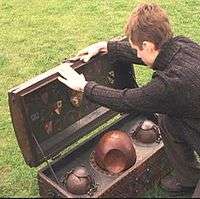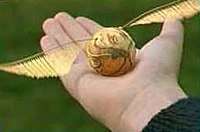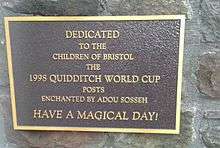Quidditch
In the world of the Harry Potter novels and movies, Quidditch /ˈkwɪdɪtʃ/ is a magical competitive sport involving flying contestants. Matches are played between two teams of seven players riding flying broomsticks, using four balls: a Quaffle, two Bludgers, and a Golden Snitch. Six ring-shaped goals are situated atop poles of different heights, three on each side of the pitch. It is an extremely rough but very popular semi-contact sport, played by wizards and witches. In the wizarding world, Quidditch has a fervent fan following.
Harry Potter plays an important position for his house team at Hogwarts: he is the Seeker and becomes the team captain in his sixth year at school. Regional and international Quidditch competitions are mentioned throughout the series. In Goblet of Fire, Quidditch at Hogwarts is cancelled for the Triwizard Tournament, but Harry and the Weasleys attend the Quidditch World Cup. In addition, Harry uses his Quidditch skills to capture a golden egg from a kind of dragon called the Hungarian Horntail (in the first task of the Triwizard Tournament), to capture a flying key in Philosopher's Stone, and on two vital occasions in Deathly Hallows — getting hold of Ravenclaw's diadem and during the final fight with Voldemort — Harry's Quidditch skills prove extremely useful. Harry has owned two broomsticks, the Nimbus 2000 and the Firebolt, both of which are lost by the series' end. His Nimbus 2000 is destroyed by the Whomping Willow in Harry Potter and the Prisoner of Azkaban and his Firebolt is lost in Harry Potter and the Deathly Hallows when he leaves Privet Drive for the last time. Aspects of the sport's history are revealed in Quidditch Through the Ages, a book published by J.K. Rowling in 2001 to benefit Comic Relief.
A modified version of the game (without magic) has been created and is played in the real world in a number of countries. In this game the players have brooms but run instead of flying. Nevertheless, the basic rules are the same.
Development
Rowling came up with the sport in a Manchester hotel room after a row with her then-boyfriend. She explained: "I had been pondering the things that hold a society together, cause it to congregate and signify its particular character and knew I needed a sport."[1] Rowling claims that the word "Quidditch" is not derived from any particular etymological root, but was the result of filling five pages of a notebook with different words beginning with "Q".[2]
Despite the sport's popularity with fans, Rowling grew to dislike describing the matches. She commented in an interview:
To be honest with you, Quidditch matches have been the bane of my life in the Harry Potter books. They are necessary in that people expect Harry to play Quidditch, but there is a limit to how many ways you can have them play Quidditch together and for something new to happen.[3]
In 2014 Rowling started publishing a series of match reports from the Quidditch World Cup on Pottermore, culminating in a short story about the final featuring the return of Harry, Ron, Hermione and their friends as adults. This generated interest from several media outlets, as it was the first new writing about the Harry Potter characters since the end of the series in 2007.[4][5][6]
Quidditch in the Harry Potter series
Quidditch is introduced in Harry Potter and the Philosopher's Stone, and is a regularly recurring feature throughout the first six books. It is depicted as being played by both professionals (as in tournaments like the Quidditch World Cup) and amateurs. A major motif of five of the Harry Potter books is the competition among the four Hogwarts houses for the Quidditch Cup each school year; in particular, the rivalry between Gryffindor and Slytherin.
Game progression
Quidditch matches are played over an oval-shaped pitch, with a scoring area at each end consisting of three hooped goal posts, each at a different height. Each team is made up of seven players, consisting of three Chasers, two Beaters, one Keeper and one Seeker. The job of the Chasers is to keep possession of the scarlet Quaffle, a spherical ball passed between players, and attempt to score goals (worth 10 points) by throwing it through one of the opponents' three hoops. These hoops are defended by the opposing team's Keeper, who ideally tries to block their goals. Meanwhile, players of both teams are attacked indiscriminately by the two Bludgers, round, jet black balls made of iron that fly around violently, trying to knock players off their brooms. It is the Beaters' job to defend their teammates from the Bludgers; they carry short wooden clubs, which they use to knock the Bludgers away from their teammates and/or toward the opposing team. Finally, the role of the Seeker is to catch the Golden Snitch, a small golden ball the approximate size of a walnut. The winged Snitch is enchanted to hover, dart, and fly around the pitch, avoiding capture while remaining within the boundaries of the playing area. Catching the Snitch ends the game and scores the successful Seeker's team 150 points. As the team with the most points wins, this often guarantees victory for the successful Seeker's team, although a notable exception is when Bulgaria Seeker Viktor Krum catches the Snitch for Bulgaria during the World Cup Final in Goblet of Fire, while his team are still 160 points behind Ireland (their opponents), thus making his own team lose.


Broomsticks
Magical flying broomsticks are one of the forms of transportation for wizards and witches, as well as being used for playing Quidditch. The two most prominent broomsticks in the books are the Nimbus 2000 and the Firebolt, both of which have been produced as merchandise by Warner Bros.[7]
The Nimbus is introduced as one of the best broomsticks in the wizarding world. Harry receives a Nimbus 2000 in Philosopher's Stone so that he can play for Gryffindor; Lucius Malfoy buys a full set of the more advanced Nimbus 2001s for the Slytherin team as a bribe so they would choose his son Draco as Seeker the following year.
The Firebolt later supersedes the Nimbus as the fastest and one of the most expensive racing brooms in existence. Harry receives a Firebolt model from his godfather, Sirius Black, after his Nimbus 2000 is destroyed during a Quidditch match in Prisoner of Azkaban. In Goblet of Fire, Harry uses his Firebolt to escape the Hungarian Horntail during the Triwizard Tournament.
Quidditch in the films and video games
Quidditch appears in five of the eight Harry Potter films. Some Quidditch subplots, such as Ron's Keeper storyline in Order of the Phoenix, were cut to save time.[8] Video games that feature Quidditch include:
- Harry Potter: Quidditch World Cup
- Harry Potter and the Philosopher's Stone
- Harry Potter and the Chamber of Secrets
- Harry Potter and the Half-Blood Prince
- Lego Harry Potter: Years 1–4
- Lego Harry Potter: Years 5–7
In the Harry Potter and the Forbidden Journey attraction in the Wizarding World of Harry Potter at the Islands of Adventure theme park, Quidditch is featured near the end where riders are flown through the Quidditch pitch. A storefront near Ollivanders Wand Shop is themed as a Quidditch supply with a Golden Snitch on the sign and a case containing animated Quaffle and Bludgers surrounded by Beaters' bats.[9]
Non-fictional Quidditch

There have been small-scale attempts to adapt Quidditch to readily available technology, using bicycles, and unicycles.[10]

In the real world, the word "Quidditch" occurs in some English placenames (long before the Harry Potter stories were written), and seems to come from Anglo-Saxon cwǣð-dīc = "mud-ditch".
A street in Lower Cambourne, Cambridgeshire, England is named Quidditch Lane, supposedly after a type of nearby dry ditch called a Quidditch. Fans have been known to visit the area.[11]
In November 2014, a plaque appeared outside the entrance of Bristol Children's Hospital attesting that the famous hooped sculptures which stand in front of the paediatric institution are, in fact, not a 50 ft-tall interactive installation inaugurated in 2001, but instead the goalposts used in the 1998 Quidditch World Cup.[12]
In 2017, Quidditch was the second word from the Harry Potter series to enter the Oxford Dictionary, following the inclusion of Muggle in 2002. Oxford Dictionaries associate editor Charlotte Buxton explained that Quidditch had gained recognition beyond the books, pointing to its existence as a real-life sport.[13]
Quidditch as a real-life sport
In 2007 the United States Quidditch Association, then named the Intercollegiate Quidditch Association or (I.Q.A) , was founded to regulate quidditch in the United States and abroad, a very popular sport amongst college students. According to the International Quidditch Association, the current international governing body of the sport, the original rules and regulation of the popular collegiate sport known as quidditch were formed "....on a sunny Sunday afternoon in 2005 by Xander Manshel and Alex Benepe, students at Middlebury College in Vermont, US." (IQA). In contrast to the fictional sport, the game is played on foot while using one hand to hold a broom between the legs.
Since 2005, many American schools, such as UC Berkeley, have added Quidditch to their list of team sports.[14] The sport has since then spread across more than 25 countries and includes multiple international tournaments, including a World Cup.[15][16] In 2012, the International Quidditch Association held the IQA World Cup, then named the IQA Summer Games, as the torch was passing through Oxford, UK for the Summer Olympics.[17]
Gameplay is reminiscent to the gameplay in the books, films, and game adaptations, though the sport has obviously been adapted to suit real-world constraints. Currently on the 10th edition of the rulebooks, quidditch is still evolving to suit safe play for the members of the teams, male, female, and those identifying outside of the binary. Apart from joining teams registered with their national governing body, individuals are also able to become an official certified referee to officiate tournaments and games throughout the year as teams compete to take part in various national and international tournaments. As the oldest national governing body, USQ has hosted a total of ten US Quidditch Cups as of 2017.
See also
References
Notes
- ↑ Furness, Hannah. "JK Rowling invented Quidditch after a row with her boyfriend". The Telegraph. Retrieved 7 May 2017.
- ↑ "J.K. Rowling on The Diane Rehm Show". WAMU. Retrieved 29 May 2017.
- ↑ "The Leaky Cauldron and MN Interview J.K. Rowling". The Leaky Cauldron. 16 July 2005. Retrieved 29 May 2017.
- ↑ Tobar, Hector. "J.K. Rowling covers the '2014 Quidditch World Cup'". LA Times. Retrieved 7 May 2017.
- ↑ Flood, Alison. "Harry Potter makes first appearance for seven years as he turns 34". The Guardian. Retrieved 7 May 2017.
- ↑ Gibson, Megan. "J.K. Rowling Just Published a New Harry Potter Story". Time. Retrieved 7 May 2017.
- ↑ MacDonald, Brady (24 March 2016). "Let's go on a virtual shopping spree at Universal's new Wizarding World". LA Times. Retrieved 29 May 2017.
- ↑ Vineyard, Jennifer (10 July 2007). "Harry Potter's First Date Flops, Quidditch Ditched: What 'Phoenix' Flick Leaves Out". MTV. Retrieved 29 May 2017.
- ↑ "Harry Potter's magic conjures success for theme park". CNN International. 6 April 2011.
- ↑ "Unicycle Quidditch Rules". Retrieved 10 October 2011.
- ↑ Village sign attracts Potter fans, BBC News
- ↑ Sad truth behind Harry Potter fan's adorable prank at Bristol Children's Hospital is revealed, Bristol Post
- ↑ Thelwell, Emma. "The next Harry Potter words to join the dictionary?". BBC News. Retrieved 29 May 2017.
- ↑ "The basics of Quidditch at Cal". The Daily Californian. Retrieved 14 October 2014.
- ↑ Carey, Alexis (15 April 2014). "From Harry Potter to Sydney schools, Quidditch has become a real competitive sport". Daily Telegraph (Sydney). Retrieved 25 April 2014.
- ↑ Flood, Alison (22 June 2016). "Quidditch leaves Harry Potter behind as (real) World Cup fever grows". The Guardian.
- ↑ Black, Alan (6 July 2012). "London 2012: Olympic Quidditch Explo Tournament Preview". Bleacher Report. Retrieved 18 February 2016.
Bibliography
- Rowling, J. K. (1997). Harry Potter and the Philosopher's Stone. London: Bloomsbury/New York City: Scholastic, et al. UK ISBN 0-7475-3269-9/U.S. ISBN 0-590-35340-3.
- Rowling, J. K. (1998). Harry Potter and the Chamber of Secrets. London: Bloomsbury/New York City: Scholastic, et al. UK ISBN 0-7475-3849-2/U.S. ISBN 0-439-06486-4.
- Rowling, J. K. (Kennilworthy Whisp; 2001). Quidditch Through the Ages (in English). London: Bloomsbury/New York City: Scholastic, et al. ISBN 0613329740.
External links
| Wikimedia Commons has media related to Quidditch. |